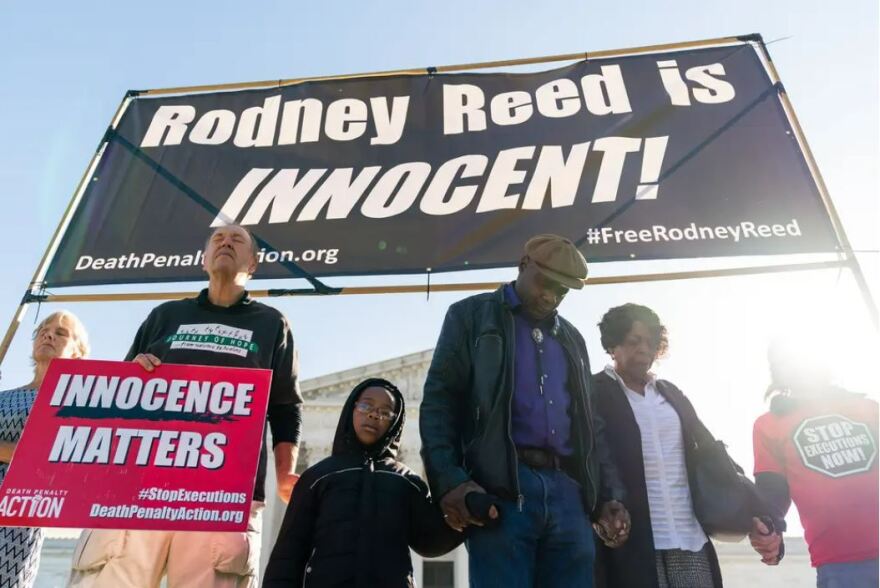Rodney Reed has been sitting on death row at Texas’ infamous Polunsky Unit for more than two decades, convicted of abducting, raping and murdering 19-year-old Stacey Stites as she drove to her early morning shift at HEB.
Reed has maintained his innocence all that time, and his lawyers have argued repeatedly that there might be a way to prove it: testing crime scene evidence that was never checked for DNA, including the murder weapon itself, a woven leather belt used to strangle Stites.
Reed’s best chance at getting that evidence tested now rests with the U.S. Supreme Court, which on Tuesday heard oral arguments centering on one procedural question: Did Reed wait too long to ask a federal court to order the tests?
Ironically, the state’s case against Reed partly relied on DNA evidence. When Reed’s sperm was found inside Stites’ body after her death, Reed became the prime suspect in her murder. Reed contends that in 1996, he and Stites were engaged in a consensual affair and had sex in the hours before her death. Reed is Black and Stites was white; his lawyers argue that Stites’ fiancé, Jimmy Fennell, also white, was violent and racist and that he likely murdered his fiancé after discovering the affair. Reed hopes to bolster this theory through DNA evidence found on the murder weapon.
The case has received widespread attention, including calls for his freedom by Texas lawmakers and celebrities like Kim Kardashian, who pointed to Reed’s compelling claims of innocence.
Reed’s execution was set for November 2019 but was stayed by the Texas Court of Criminal Appeals and sent back to a lower court for review of new claims, including that he is innocent of the crimes. In 2021, after an evidentiary hearing, a district judge ruled the new evidence was not enough to justify granting Reed a new trial.
The Court of Criminal Appeals has received the recommendation but has not yet ruled on the outcome of Reed’s state appeals.
The state has argued that the crime scene items should not be tested because they were improperly stored and may be contaminated. In 2014, a district court agreed, and in 2017, the Criminal Court of Appeals, Texas’s highest criminal court, affirmed that decision.
Reed’s attorneys then brought a federal claim under Section 1983, which allows individuals to sue state actors for violating their rights. In Texas, those claims have a statute of limitations of two years. The state is arguing that the statute of limitations began in 2014 when the district court made its initial decision not to test the DNA.
“No provision of Texas law requires an applicant to appeal a denial of DNA testing in state court,” the state argued in its brief to the Supreme Court. “Reed knew that he was injured when he was denied testing, and he could have pursued a facial challenge in federal court on due-process grounds immediately after that denial.”
The Criminal Court of Appeals upheld the lower court’s ruling in April 2017. Reed’s attorneys argue that the clock started on the statute of limitations in October 2017, after the appeals court denied Reed’s request for a rehearing. Reed filed his 1983 claim in August 2019.
The Fifth Circuit agreed that the statute of limitations in Reed’s case was tied to the initial ruling, but in a different case, the Eleventh Circuit had ruled that the statute of limitations begins once the options for relief in state court are exhausted.
“A federal court should not proceed with adjudication before state courts have had their say,” a dozen legal scholars wrote in an amicus brief filed in support of Reed, warning that forcing plaintiffs to file suit in state and federal courts simultaneously “invites unnecessary intrusions into state processes.”
In Tuesday’s oral arguments, Texas Solicitor General Judd Stone told the justices that the more time goes by, the harder it is for the state to defend its case, as evidence degrades and witnesses age. “Additional delay harms the state’s ability to be able to redress this if, for example, he’s entitled to a new trial for one reason or another, which he most emphatically is not,” Stone argued.
In another amicus brief filed in support of Reed, the NAACP Legal Defense Fund noted that if the Supreme Court limits the amount of time incarcerated people have to bring federal claims regarding untested DNA, the decision “will disproportionately harm Black people and other people of color, who are more likely to be wrongfully convicted and must rely on access to DNA evidence to prove their innocence.”
“In cases like Mr. Reed’s, where racial bias or other arbitrary factors undermine the reliability of a conviction, DNA evidence is a critical means of remedying wrongful convictions,” the brief stated.
Since Reed was convicted, multiple witnesses have come forward to corroborate that Reed and Stites were having a relationship and that Stites was scared of Fennell before her death. In 2008, Fennell pled guilty to kidnapping a woman and engaging in “improper sexual conduct” with her while on duty with the Georgetown Police Department. In an interview, the victim told filmmaker Ryan Polomski that he pulled out his gun, put it near her head and raped her.
Fennell was released from prison in 2018 after serving 10 years. According to a sworn affidavit by a member of the Aryan Brotherhood who was incarcerated with Fennell, Fennell told him that he killed his fiancé because she slept with a Black man.
Reed has also been accused — but not convicted — of multiple other sexual assaults. He was charged, and acquitted, in one case. In 2021, while testifying in the evidentiary hearing in Reed’s case, Fennell denied there was any truth to the statements that multiple witnesses had made, including that he was violent toward Stites, that he’d admitted to the crime while in prison and that Reed and Stites knew each other. “As far as I'm concerned,” he said, “they’re all lying.”


